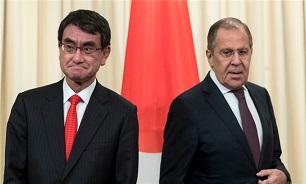Moscow Views Deployment of US Missile Defense in Japan as Threat
 "We have once more focused our attention on some steps of Washington’s. Among them are the deployment of global missile defense units in Japan, its increasing military presence in the region and other actions in the disarmament and arms control fields, where the United States is smashing all the current agreements. We view these steps as a threat to our country," Lavrov stated, according to TASS.
"We have once more focused our attention on some steps of Washington’s. Among them are the deployment of global missile defense units in Japan, its increasing military presence in the region and other actions in the disarmament and arms control fields, where the United States is smashing all the current agreements. We view these steps as a threat to our country," Lavrov stated, according to TASS.
Lavrov stated at a meeting with Kono that there still are significant differences between the Russian and Japanese positions on the peace treaty issue.
The Russian foreign minister recalled that the current round of talks was taking place in accordance with a decision made by the two countries’ leaders to step up dialogue based on the 1956 Joint Declaration.
"In accordance with these agreements, you and me have a serious task to make sure that bilateral relations reach a new level, which would facilitate the search for mutually acceptable solutions," he added.
"During the previous rounds of talks that took place in January and February, as well as during consultations between our deputies, the parties clarified their principal approaches and thoroughly discussed historical and legal aspects," he stated, noting, "I hope that these talks and consultations allowed the parties to better understand differences in their positions. The differences are still rather significant."
He was also hopeful that the meeting would make it possible for the parties to find ways to bring their positions closer.
According to the Russian foreign minister, it is important to thoroughly understand the situation "in order to have a realistic assessment of the prospects" for talks between Russia and Japan.
"I look forward to continuing substantive and constructive discussions," the Russian top diplomat pointed out.
Following talks with Lavrov, Kono said Moscow and Tokyo have failed to overcome differences on the peace treaty issue at the Moscow meeting between the two countries’ foreign ministers.
"I can’t say that we managed to overcome differences at today’s talks but we have firmly decided that building a true partnership through resolving this complicated issue is in our strategic interests. This is why we meet so often and spare no effort to hold discussions," he noted.
"We have agreed not to disclose the details of the talks so I won’t say anything in this regard. As for our differences, I always clarify our position to our partners," Kono went on to say, adding that "this time, just like at our February meetings, it came down to harsh statements but this is not the first meeting between Minister Lavrov and me, we have trust-based relations that allow us to talk frankly with each other".
The Japanese foreign minister confirmed that Tokyo was ready to maintain dialogue with Moscow to resolve differences.
Since the mid-20th century, Russia and Japan have been holding consultations in order to clinch a peace treaty as a follow-up to World War II. The Kuril Islands issue remains the sticking point since after WWII the islands were handed over to the Soviet Union while Japan laid claims to the four southern islands. In 1956, the two countries signed a joint declaration on ending the state of war and restoring diplomatic and all other relations, however, a peace treaty has still not been reached. Moscow has stated many times that Russia’s sovereignty over the islands cannot be called into question.
In mid-November 2018, Russian President Vladimir Putin and Japanese Prime Minister Shinzo Abe held a meeting on the sidelines of the ASEAN summit in Singapore and agreed that the two countries would speed up peace treaty talks based on the 1956 declaration. The two countries’ foreign ministers, Sergey Lavrov and Taro Kono, oversee the negotiations conducted by their deputies, Igor Morgulov and Takeo Mori.
The Joint Declaration said that the Soviet government was ready to hand Shikotan Island and a group of small islands over to Japan, adding that Tokyo would get actual control of the islands after a peace treaty was signed. However, after Japan and the United States had signed the Treaty of Mutual Cooperation and Security in 1960, the Soviet Union withdrew its obligation to hand over the islands. A Soviet government’s memorandum dated January 1960, said that those islands would only be handed over to Japan if all foreign troops were pulled out of the country.
Message end/
